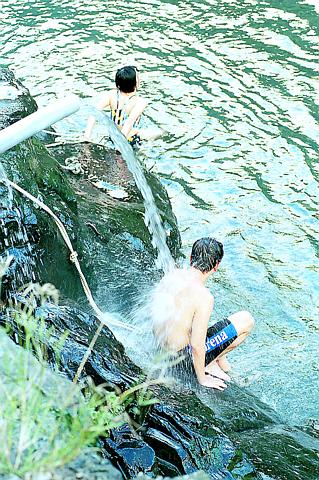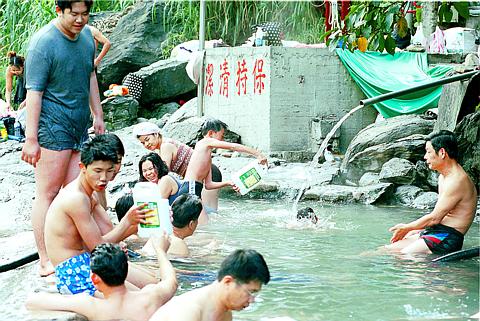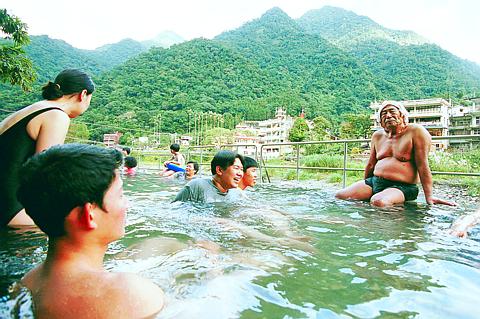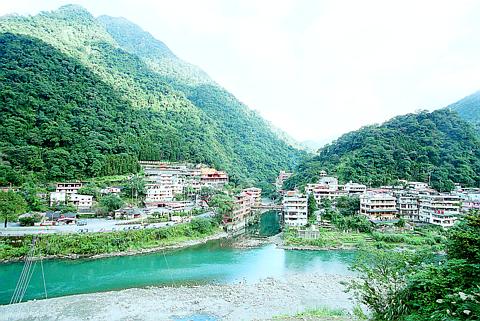I counted each mileage marker through clenched teeth as it loomed out of the mist and passed. I knew I was nearing Wulai when the cement safety barriers at the side of the road began to be tiled over in the intricate designs of aboriginal tribes.
Despite the cold, the road was beautiful. A roller coaster of wet blacktop winding its way along the banks of the Nanshih River, doubling back on itself, and winding again deeper into the folds of the surrounding mist-shrouded mountains.
But being loose jacketed against the cold and wet, I was having trouble enjoying the ride. One thing increasingly pervaded my thoughts -- immersion in a boiling outdoor hot spring. Thoughts of thawing out by sinking into a pool up to my shoulders -- the tingling burn on my skin, the steam rising around my head, the sweat and heat -- kept me going until I finally pulled into town.

PHOTO: CHIANG YING-YING, TAIPEI TIMESN
Twenty-nine kilometers south of Taipei, Wulai is a scenic mountain area known for its aboriginal heritage and high-mountain landscapes. Being just a short jaunt from Taipei, Wulai has long been a popular spot for day-trippers who, come the weekend, migrate down in waves from the capital city.
A seasonal escape
In the summer months most come to cool off by swimming and fishing in the area's cold mountain brooks and hiking along the many well-shaded mountain trails. But in the winter, visitors to Wulai come to experience the opposite -- heat. Hot springs, to be exact, and Wulai has a hot spring for all tastes and occasions. Natural, outdoor, rock pool springs by the river cater to nature loving communal sorts, while indoor spa facilities and hotel room tubs are all available to visitors who want a more private -- and more expensive -- soaking experience.

PHOTO: CHIANG YING-YING, TAIPEI TIMESN
When I finally parked my motorcycle I had to pry my frozen hands from the handle bar grips. I decided to head straight for the natural pools on the far side of town. To get there, one must first cross a red bridge that traverses the river at the end of Wulai's main street. Crossing the bridge requires paying a toll of NT$50 for adults and NT$40 for students and seniors.
Halfway along the bridge clouds of steam billowing out of the cold, rushing river gave away the position of the springs. A wooden set of stairs at the far bank led down to a rock flat beside the river. Up ahead I could see flashes of pink skin through openings in the jagged shafts of steam that, from a distance, seemed to rise skyward from the rock itself. Closer, I could see the forms of about 35 people, most of them elderly, as they milled about in an assortment of pools at the river's edge.
As I arrived at the pools I noticed homemade steam rooms made from tarps strung over billowing vents in the rock. There were also rows of wooden seats and some industrial looking hoses that brought both hot and ice-cold water cascading down from above for the purpose of pressure massage. There were even men's and women's dressing rooms built out of wood and tarps at the far end of the last pool.

PHOTO: CHIANG YING-YING, TAIPEI TIMESN
Dressing down
Although not clearly marked, I learned that the men's and women's rooms are separate only after unwittingly attempting to gain entry to the women's room. "That's the men's room over there," said a smiling woman behind me just after I pulled back the tarp covering the women's room and came face-to-face with a portly woman who, clutching her torso, grunted and threatened to hit me with a plastic bucket.
Once in the men's room, I ripped into my bag only to find that I'd forgotten my swim trunks. After cursing mightily, I contemplated springing out and making a naked run for the nearest pool, but decided that I was already a suspect character and that blatant, frontal nudity would only exasperate my position as an outsider. Reluctantly, I decided to run back to town and buy a bathing suit.

PHOTO: CHIANG YING-YING, TAIPEI TIMESNN
"Very handsome!" a woman said, giving me the thumbs up as I held up a pair of neon green briefs that looked more like something out of Victoria's Secret than a men's swimsuit. The store was full of every weird and colorful item for which Taiwan tourist shops are famous. Racks of wooden Japanese-style sandals, plastic binoculars, squirt guns, instant cameras, bubbles, fake Barbie dolls, instant cameras, fake aboriginal headdresses. I finally settled on a comparatively boring pair of "Fly Jordan" knee-length briefs, paid the extortion fee and made a run for the hot spring.
Back in the men's dressing room I made the change. A perfect fit. Seconds later I was stepping into the hot spring pool. I had chosen an area where no one else was bathing and I quickly found out why. It was one degree below boiling. I had just settled in when my nerves relayed to my brain that my skin was scalding. I came back out of the pool in one swift and awkward lunge.
Soaking it up
After that I moved to a more populated area and found that the water was just right. I settled in a laid my head back. Across the river, neon signs in the town were just starting to flick on. The mountaintops beyond were ringed with slow moving banks of mist and I could hear the suck and gurgle of the river as it flowed by on just the other side of the rock barrier. I exhaled and felt the deep warmth start to work down into my bones and joints.
"You don't come here often," an elderly woman with thick glasses and a swimcap said, startling me. "I'd know, because I come here all the time."
She introduced herself as Mrs. Hsieh. "Would you like a cup of tea?" she asked.
I tried to refuse, but she was already out of the pool and reaching for a big red thermos. I drank the tea and was warmed further. I sat up on the edge and returned her cup. From this new perch, I noticed that people were swimming in the river. "Is that river water cold?" I asked Mrs. Hsieh.
"Yes, it's freezing, but there is a hot water fountain down near the bank," she said, pointing to a man who was letting a stream of steaming water, which was cascading down from a length of PVC pipe, pound against his back.
"You should try that," she said. "It's really comfortable."
Before I knew it, Mrs. Hsieh was up again and yelling at the man down by the water's edge. "Hey you!" she yelled. "Get out of the way so our foreign friend can have a go!"
The man looked momentarily confused, but did what Mrs. Hsieh asked and relinquished his position. I realized that Mrs Hsieh had some pull around the hot spring. A few other people who stood shivering and dripping, waiting in line for the hot water massage, stared at me as Mrs. Hsieh directed me past them until I was under the stream of water.
"Now let it hit your back!" she yelled. "Yes, yes! Now isn't that comfortable?" I assured her it was and concentrated on not looking up at the faces that had gathered to watch me bathe.
But the pounding water really was comfortable so I soon forgot about the awkwardness of the situation. I let it pound against my neck and back. And then, acting on an impulse, I plunged into the icy river. Gasping, I scrambled back under the stream that now felt like a pounding torrent of lava against my skin.
Getting dressed, I was struck by how good clothes feel after a hot spring bath in the winter. Everything feels dry and warm and your body has a tired, comfortable inner-warmth. It was with this feeling that I returned to my motorcycle and went in search of a place to drink more hot tea.
I found what I was looking for on the road that winds up into the mountain behind the town when I came across a little restaurant tucked behind a hedge of bamboo plants. It had a well-lit porch and comfortable looking chairs.
Keeping warm
I pulled in and ordered a pot of tea. It was served with a complementary dish of warm, honeyed yam slices. After an hour or so, I headed back down toward Taipei. It was dark now and the rain was starting up again. I noticed, even before I hit the road back to Taipei, that I had again become chilled. As I motored toward the edge of town, I passed what appeared to be a hot spring spa.
I stopped my bike in the middle of the wet road and looked back. Sure enough, there it was, the hot spring sign -- the circle with slivers of steam wafting upwards. A billboard promised a steam room, an outdoor hot pool, a Jacuzzi and a few other things, but I didn't need to read on. I'd already made up my mind.
I turned my bike around in the road and headed toward the bright lights of the front door. It would be a long, cold ride back to Taipei and I would need some serious warming up to see me through.
For your information:
Getting there: To reach Wulai from Taipei, go east on Roosevelt Rd. and past Hsintien. Look for Highway 9, which will have signs directing visitors to the village. The Hsintien Bus Company has buses departing from Kungyuan Rd. near the 2-28 Park in Taipei. The trip takes about an hour.
For additional details on Wulai, calll the Scenic Area Adminstration Office at (02) 2661-6355.

Wooden houses wedged between concrete, crumbling brick facades with roofs gaping to the sky, and tiled art deco buildings down narrow alleyways: Taichung Central District’s (中區) aging architecture reveals both the allure and reality of the old downtown. From Indigenous settlement to capital under Qing Dynasty rule through to Japanese colonization, Taichung’s Central District holds a long and layered history. The bygone beauty of its streets once earned it the nickname “Little Kyoto.” Since the late eighties, however, the shifting of economic and government centers westward signaled a gradual decline in the area’s evolving fortunes. With the regeneration of the once

Even by the standards of Ukraine’s International Legion, which comprises volunteers from over 55 countries, Han has an unusual backstory. Born in Taichung, he grew up in Costa Rica — then one of Taiwan’s diplomatic allies — where a relative worked for the embassy. After attending an American international high school in San Jose, Costa Rica’s capital, Han — who prefers to use only his given name for OPSEC (operations security) reasons — moved to the US in his teens. He attended Penn State University before returning to Taiwan to work in the semiconductor industry in Kaohsiung, where he

In February of this year the Taipei Times reported on the visit of Lienchiang County Commissioner Wang Chung-ming (王忠銘) of the Chinese Nationalist Party (KMT) and a delegation to a lantern festival in Fuzhou’s Mawei District in Fujian Province. “Today, Mawei and Matsu jointly marked the lantern festival,” Wang was quoted as saying, adding that both sides “being of one people,” is a cause for joy. Wang was passing around a common claim of officials of the People’s Republic of China (PRC) and the PRC’s allies and supporters in Taiwan — KMT and the Taiwan People’s Party — and elsewhere: Taiwan and

Perched on Thailand’s border with Myanmar, Arunothai is a dusty crossroads town, a nowheresville that could be the setting of some Southeast Asian spaghetti Western. Its main street is the final, dead-end section of the two-lane highway from Chiang Mai, Thailand’s second largest city 120kms south, and the heart of the kingdom’s mountainous north. At the town boundary, a Chinese-style arch capped with dragons also bears Thai script declaring fealty to Bangkok’s royal family: “Long live the King!” Further on, Chinese lanterns line the main street, and on the hillsides, courtyard homes sit among warrens of narrow, winding alleyways and